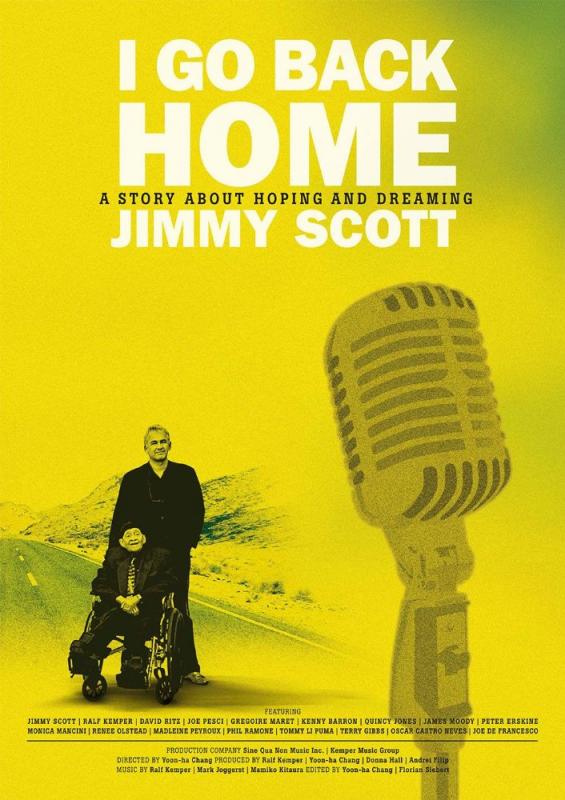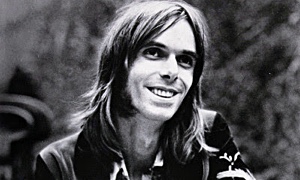Home » Jazz Articles » Film Review » Jimmy Scott: I Go Back Home
Jimmy Scott: I Go Back Home
 Jimmy Scott: I Go Back Home
Jimmy Scott: I Go Back Home Kemper Music, Sine Qua Non Music
2016
"Little" Jimmy Scott (1925-2014) was for a long time the world's greatest jazz singer nobody ever heard of. Enormously talented, with an intuitive grasp of the jazz idiom and the blues, he began his ascendance as a singer with Lionel Hampton's band in the 1950s, and then almost vanished from the scene for three decades. In 1991, Velvet Underground guitarist

Lou Reed
guitar1942 - 2013

Doc Pomus
composer / conductor1925 - 1991
Due to a genetic medical condition called Kallman syndrome, Scott's adolescent voice remained high register, and he stayed short in stature, not the best image for a crooner. But it wasn't his voice or stage persona that made an everlasting impression on

Ray Charles
piano and vocals1930 - 2004

Quincy Jones
arranger1933 - 2024

Billie Holiday
vocals1915 - 1959

Dinah Washington
vocals1924 - 1963
The film Jimmy Scott: I Go Back Home is a documentary about Scott made in the last year or two of his life, when he was elderly and suffering from medical conditions that confined him to a wheelchair. It takes us through German record engineer and producer Ralf Kemper's ambitious, heartfelt, and risky project to come to America and make a recording of Scott, one of his jazz idols, with guest vocalists and a full orchestra. Kemper had to revive Scott from his bedridden condition, gather together guest artists and a costly studio orchestra, and make it all come together against great odds. Scott's biographer, David Ritz, provides the context and analysis. The two real life protagonists—Kemper and Scott—engage in conversations about their lives, dilemmas, hopes, and dreams, interspersed with excerpts from recording sessions, commentaries and tributes to Scott, and connecting scenes of travel, locales, and recording arrangements.
Kemper's project falls into two categories: late career "Duet" albums by the likes of

Frank Sinatra
vocals1915 - 1998

Tony Bennett
vocals1926 - 2023

Pat Martino
guitar1944 - 2021

Frank Morgan
saxophone, alto1933 - 2007
The film shows excerpts from recording sessions with Scott accompanied by saxophonist

David Sanborn
saxophone1945 - 2024

Kenny Barron
pianob.1943

James Moody
woodwinds1925 - 2010

Joey DeFrancesco
organ, Hammond B31971 - 2022

Renee Olstead
vocals
Monica Mancini
vocalsb.1952

Madeleine Peyroux
vocals
Dee Dee Bridgewater
vocalsb.1950

Arturo Sandoval
trumpetb.1949

Terry Gibbs
vibraphoneb.1924
The 2016 Eden River Records recording that resulted from Kemper's production, and which consists of strictly musical tracks, was Scott's last, other than compilations of previous work. It's really a postscript to the film, because it contains the finished product of the events depicted there. Although, as in Billie Holiday's case as well (Lady in Satin, Columbia, 1958), the voice is a little weak, the expressiveness is nevertheless profound. For one example, the last track consists of a very unusual interpretation of "Poor Butterfly" that is virtually a spoken poem version with a hint of cabaret singing. It will tear you apart and put you back together again.
Tags
Jimmy Scott
DVD/Film Reviews
Victor L. Schermer
Lou Reed
Doc Pomus
Ray Charles
Quincy Jones
Billie Holiday
Dinah Washington
frank sinatra
Tony Bennett
Pat Martino
Frank Morgan
David Sanborn
Kenny Barron
James Moody
Joey DeFrancesco
Renee Olstead
Monica Mancini
madeleine peyroux
Dee Dee Bridgewater
arturo sandoval
Terry Gibbs
Comments
PREVIOUS / NEXT
Support All About Jazz
 All About Jazz has been a pillar of jazz since 1995, championing it as an art form and, more importantly, supporting the musicians who make it. Our enduring commitment has made "AAJ" one of the most culturally important websites of its kind, read by hundreds of thousands of fans, musicians and industry figures every month.
All About Jazz has been a pillar of jazz since 1995, championing it as an art form and, more importantly, supporting the musicians who make it. Our enduring commitment has made "AAJ" one of the most culturally important websites of its kind, read by hundreds of thousands of fans, musicians and industry figures every month.






 Buy Now
Buy Now





















